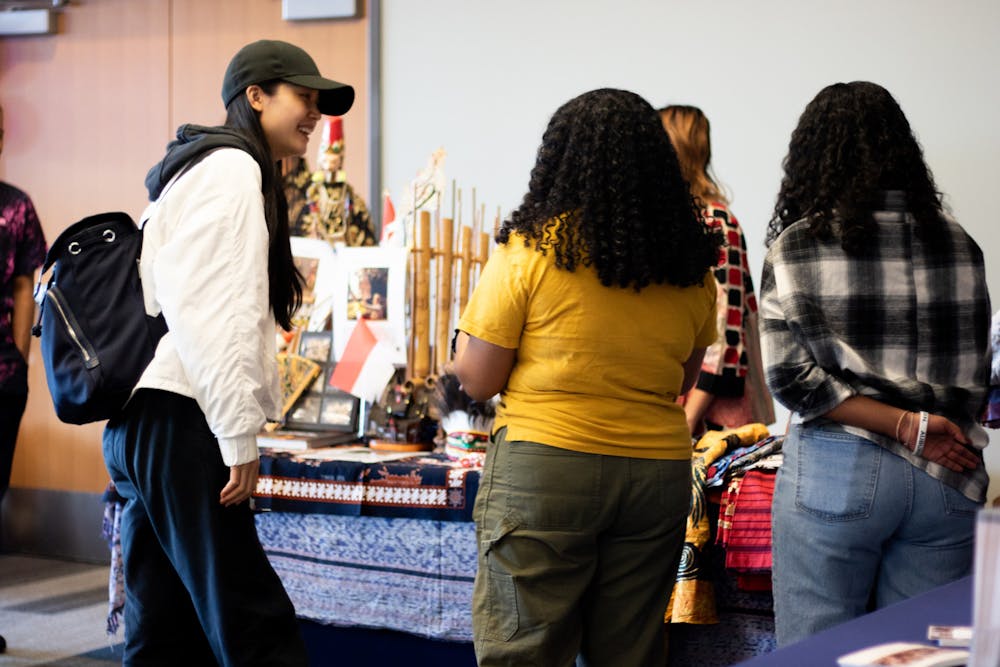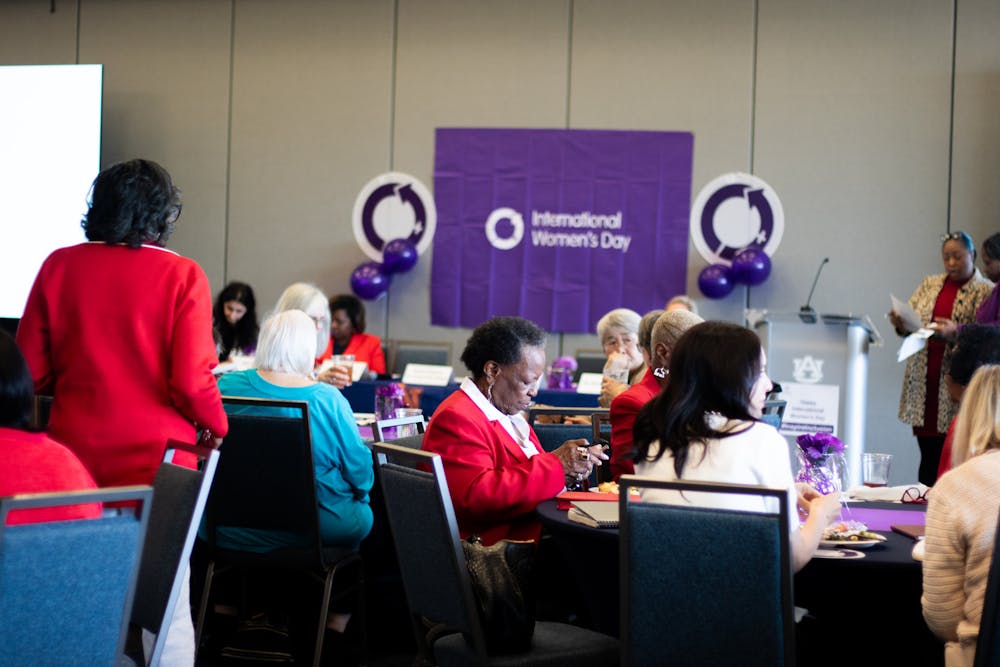On March 16, Auburn University hosted a lunch seminar to celebrate International Women's Day in the Melton Student Center ballroom from 11:00 a.m. to 1:00 p.m. The event, hosted by the International Cultural Center and the Women and Gender Studies program, highlighted women's achievements, struggles and issues worldwide.
Each year, ICC highlights a country or region to educate the campus about its culture and history. This year, the program explored Indonesia's culture, experiences and history. The program also helps promote global awareness through classes, events and study abroad programs.
Numerous professors, faculty and students sat and socialized with each other while the panel of faculty, student representatives and community members prepared their seminar. During their preparation, event workers served lunch, and attendees had the opportunity to view and learn about the Indonesian art and artifacts provided.

The display of Indonesian art and artifacts allowed for attendees to learn more about Indonesian culture.
Before the panel began, the host Chippewa Thomas urged the audience to celebrate female empowerment outside of International Women's Day. Thomas is the director of faculty engagement at Auburn, and she introduced Dr. Andrew Gillespie to give his welcoming speech.
Gillespie, assistant provost for international programs, explained that it is essential for societies worldwide to listen to women's thoughts and experiences in their societies and abroad. He told the audience nothing could ever be accomplished on campus without the support and action of Auburn women.
Dr. Janice Clifford, the director of Women's and Gender Studies, Sociology, Anthropology & Social Work, explained International Women's Day to the audience and announced the official theme of the 2024 year: "Inspire inclusion." She encouraged everyone to break down stereotypes and barriers and observe women from all backgrounds and their resilience.
After Clifford, a student from the Association of Indonesian Students introduced the special guest speaker, Consul Gen. of Indonesia Andre Siregar. Siregar gave the opening remarks and spoke of the importance of the women of Indonesia.
Amid the crowd stood his cousins and sisters listening to Siregar and other speakers. They had flown from Indonesia to see Siregar speak at the event. Siregar told the audience about his excitement for being at Auburn and the showcase of Indonesian culture. He explained that he had three daughters, ages seven, 16 and 23, and that in Indonesian culture, women are honored.
Siregar spoke about how Indonesian women have led and run the country throughout its history and have a rich culture. As he finished his speech, Siregar urged the audience to honor all of the women who had died in the past few months.
International Women's Day is an annual holiday that occurs on March 8. According to the official website, the holiday highlights the social, economic, cultural and political achievements of women while also calling for the continued efforts of gender equality across the world. Although the official International Women's Day occurred during Auburn's spring break, ICC and the Women and Gender Studies programs wanted to showcase the holiday's importance to the Auburn community.
The first International Women's Day was on March 19, 1911, when over one million people throughout Denmark, Austria-Hungary, Switzerland and Germany recognized the holiday. Both women and men marched to advocate for women's right to vote, work and hold positions in office and to tear down female discrimination.
On March 8, 1917, the women of Russia formed a "Bread and Peace" demonstration to demand the end of World War I, tsarism and food shortages. A week after the fierce protest of the Russian women, Tsar Nicholas II renounced his throne, and the provisional government of Russia granted voting rights to women.
As Russia revolutionized and changed governments, Bolsheviks Alexandra Kollontai and Vladimir Lenin made International Women's Day an official holiday in the Union of Soviet Socialist Republics. After the holiday's recognition in the USSR, other countries like China began to recognize it as well.
It wasn't until the second-wave feminist movement that multiple organizations and governments began to recognize the holiday. In 1975, the United Nations celebrated International Women's Day and declared the year "International Women's Year." The UN utilizes International Women's Day to advocate for world peace and women's rights.
In the 2000s, critics of Western economies argued that International Women's Day has become too monetized, with many companies only partaking in the holiday to promote their products or to argue for gender equality briefly. Although gender equality has become more tangible in multiple countries, activists for International Women's Day point out that pay inequality, lack of political and business representation, healthcare disparities, violence against women and educational gaps are still huge issues women across the globe face.
The panel comprised five women: Michelle Schultz, Lava Asaad, Tiffany Gibson, Nida McKee and Elena Roversi. Consul Gen. Siregar also sat with the panelists and provided insight on women and women's rights in Indonesia.
Thomas began the seminar by asking the women on the panel who they leaned on when they faced obstacles in their lives, academics and careers.
Schultz, the founder of Baby Steps at Auburn University, explained that she leaned on her husband Matt Schultz when she found out she was pregnant during college. With the pressures of finishing her degree, Michelle felt it was best for them to terminate the pregnancy. She explained it was traumatic and led to her needing to rely on her husband for emotional support.
Throughout the years, the couple realized how impactful and painful their decision had been on them and the other people in their lives. This led them to founding the Baby Steps program at Auburn University 12 years after they made their decision.
Baby Steps is a program that supports students in college who are facing unplanned pregnancies or are already parents by providing them with resources, housing, support and community for the students so they can continue to earn their degrees.
Roversi, a Ph.D. student in public administration and public policy, said that when she faced overwhelming uncertainty about where she wanted to study for her first years after earning her bachelor's degree in development economics and international development, her friend helped her immensely with finding universities and applications.
Roversi's friend helped her get into the Free University of Brussels. There, she taught students Italian and studied international relations, human rights policies, political systems and foreign affairs. Roversi has leaned on her husband, family and herself throughout her career. She explained that women must look within themselves and understand their skills, limits and worth.
McKee is a faculty advisor of the Indonesian Students Association and a lecturer in chemistry, and she said that she leaned on family and teachers when she found out she had cancer in high school.
When McKee wanted to give up, a professor refused to let her and told her she had potential. Her mother told her she could do anything she wanted to do if she applied herself. She also explained that earning a scholarship to study in the United States helped her immensely.
Gibson is the founder of Girls STEPS, Inc. and a former Opelika councilwoman. Gibson recalled witnessing her single mom running a household and how resilient her mom was throughout Gibson's childhood.
Girls STEPS, Inc. is a non-profit organization in Opelika and serves young girls from ages three to 18 by providing them with activities, educational opportunities and self-empowerment lessons. Gibson is also a former city councilwoman for Opelika.
Asaad, a lecturer in the English department, explained that her family and friends played an important role in pushing her through her obstacles. Her grandmother pushed Asaad to be self-reliant and that education would be one of the only ways that Asaad could go far.
The panel also answered questions on other obstacles they faced, solutions they came up with, how the next generation of women will have to navigate through their struggles and how to teach young men to be aware of the social issues the women in their lives face.
After the panel concluded, the panelists and Siregar were honored with a cake. Auburn University also recognized audience members and panel members with a gift bag. Dr. Adeola Fayemi, the director of Intercultural Education and Inclusion in the Office of International Programs, recognized the panelists and a few members of the audience for their contributions to women's empowerment.
Do you like this story? The Plainsman doesn't accept money from tuition or student fees, and we don't charge a subscription fee. But you can donate to support The Plainsman.
Michaela Yielding is a senior in journalism currently serving as the news editor. She has been with The Auburn Plainsman since fall 2023.





